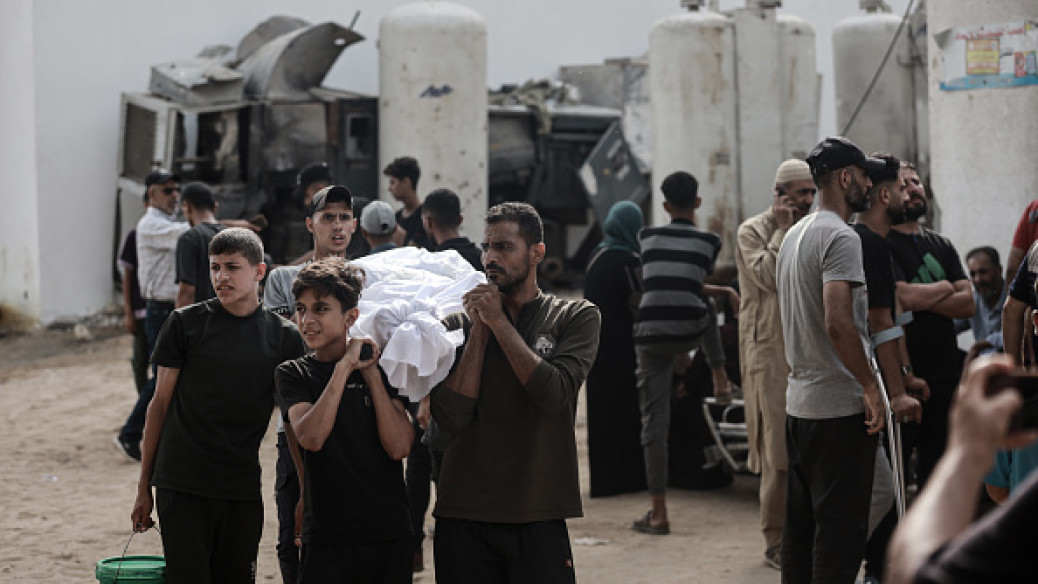Who were the people killed in Israel’s strike on Al-Baqa Cafe?
Israel hit Al-Baqa Cafe, one of the last cultural hubs in Gaza City, killing dozens of journalists and artists as survivors recounted 'hell unleashed'.

Gazans mourned dozens of people killed in the Israeli strike on the cafe [Getty]
More than 30 people were killed last week when an Israeli missile hit Al-Baqa Cafe, a makeshift outdoor venue on Gaza City’s western beachfront. Scores more were wounded.
Medical teams and Civil Defence crews worked into the night recovering bodies from the rubble and treating the wounded. The café, constructed from tents and plastic sheeting, had become a rare gathering space for Gaza’s civilians after nearly nine months of war.
Wadea Abu al-Saud, a journalist who survived the bombing, told The New Arab: "It was a calm evening, just like always.
"We used to gather at the café because it had internet, so we could send our reports and chat to ease the pressure. The place wasn’t just for journalists, there were children, women, families. Suddenly, I stepped outside to take a phone call, and just a few steps away, everything turned to ash."
Israel hits heart of Gaza's cultural heritage
Among the dead were figures who represented the heart of Gaza’s cultural and professional life.
Photojournalist Ismail Abu Hatab, known for documenting the war’s civilian toll, was killed. His images had appeared in both local and international media, capturing Gaza’s grief and resilience throughout Israel’s relentless bombardment for months.
Malak Musleh, 21, Gaza’s youngest female boxer, also died in the strike. She had trained young athletes and often spoke publicly about the challenges faced by female athletes in Gaza. Her death is seen as a blow to a generation seeking strength through sport.
Visual artist Frans Al-Salmi was killed just weeks after finishing a charcoal painting of a woman in a shroud. A photograph of her lifeless body, lying in the same position, circulated widely online. Al-Salmi had hosted workshops in displacement shelters and was committed to preserving Gaza’s cultural life.
Footballer Mustafa Abu Amira, a forward for Al-Hilal Gaza Club, was also among the victims. He had continued volunteering in youth sports even after losing family members in earlier strikes.
Others were less fortunate. Lana, 27, was gravely injured. "My daughter… has lost her ability to speak and move," said her father, Fadi Kamal, who made the long walk from Nuseirat to reach her hospital bed. "Those were moments no human heart can bear."
The cafe was struck without warning. Survivors described scenes of chaos, fire, and dismembered bodies.
"I didn’t hear the missile. I didn’t see it coming," al-Saud told TNA. "All I felt was the earth trembling beneath my feet, fire erupting in every direction, and screams piercing the sky. I collapsed in terror and blacked out.
"It struck with surgical precision at the heart of the café. Had I not stepped out for that phone call, I wouldn’t be here talking to you now."
Survivor Sami al-Hawajri added: "I was sipping coffee and scrolling on my phone," he said. "Without any warning, the ground trembled… Everything turned to ash in an instant.
"I still see in my mind the faces that were with us and vanished. One of my friends was sitting across from me, I never saw him again, as if he evaporated," he added. "What hurts me most now is not just what happened, but how the world sees us… We were just trying to breathe, for one moment. But even that was taken from us."
Kamal also searched for his granddaughter, flung away by the blast, only locating her two days later. "Several women who had been sitting with my daughter at the café were killed," he said, adding: "Every time I see her lying there, I wish for death."
The strike came as Gaza’s health system teeters on the brink of collapse and deadly Israeli strikes continue daily.
On Tuesday morning, at least 18 people were killed across the Gaza Strip in Israeli airstrikes.
The United Nations Population Fund (UNFPA) warned this week that hundreds of newborns in incubators at Khan Yunis’s Nasser Hospital risk death for lack of formula milk.
Israel has attacked dozens of healthcare facilities in Gaza throughout the conflict, putting most of the devastated territory's hospitals out of service.
Fuel, necessary to power life-saving equipment, also ran out in the Gaza Strip on June 30.
WHO reported 734 attacks on healthcare since October, and fuel supplies, necessary to power life-saving equipment, run out entirely on June 30 as patients wait for urgent deliveries.